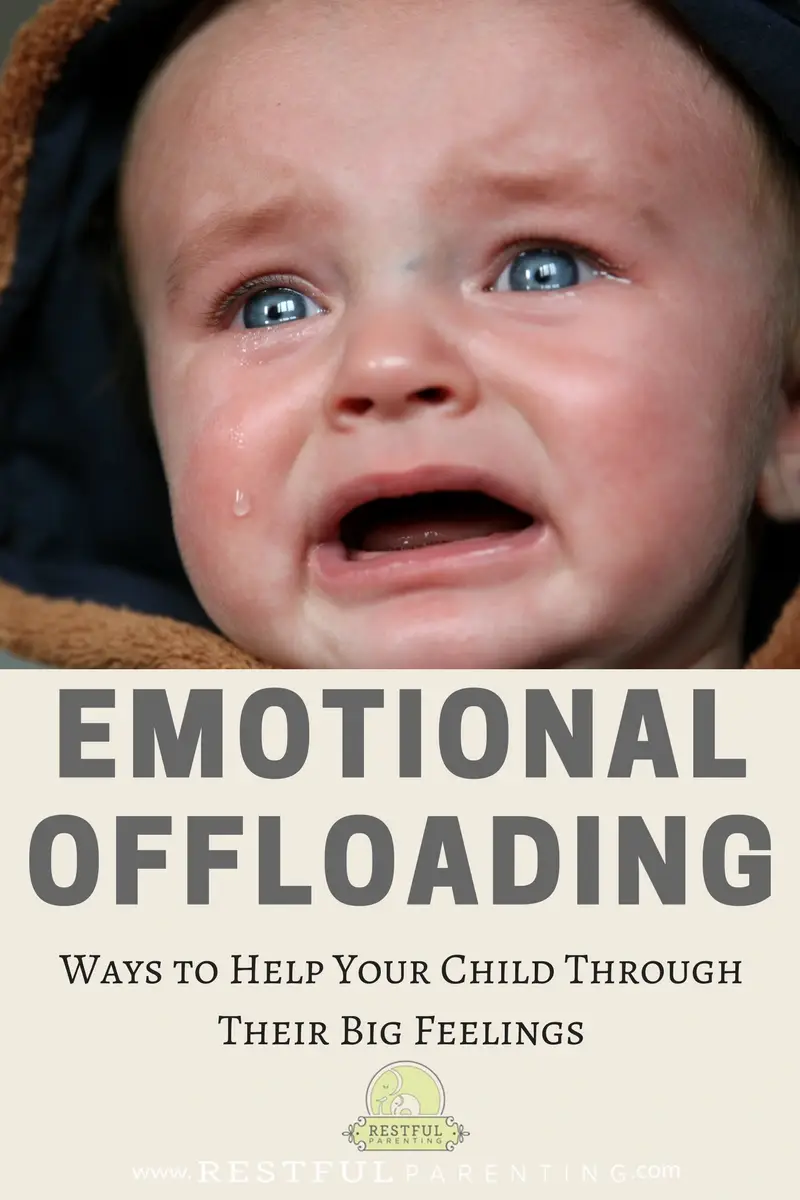Emotional Offloading: Ways to Help Your Child Through Their Big Feelings
Share this:

When your child cries, is it your first instinct to make their crying stop? When they are upset because they want something or because they are having a meltdown, we usually want to do anything to make them stop. Have you ever been with your child when they wanted a toy, or didn’t want their dad to go to work and you try to distract them by having them look outside, turning on the TV or feeding them? This is our natural instinct because we really don’t want to see our children upset. It’s important to understand your child’s emotions, remember why they are crying and that those tears can actually be helping them heal.
When their needs have been met and you know that there is nothing physically wrong with them, we actually want to encourage some crying! Those tears that we see during a big emotional offload can have healing properties so encourage those tears and your little one will feel better!
What is emotional offloading?
This is very different than leaving your child to cry it out and figure it out on their own. Listening to your child offload is a lot like listening to your best friend vent. Would you tell her to put her tears away and that you would listen when she was done crying?
They are crying to tell us how they are feeling and to heal from the upset of their day to day. Some offloading will be big, significant offloads while others will be minor and short lived. Regardless of how big, how long or how significant or insignificant the offloading is, it is still so important and needed for them.
Recognizing when you may not be listening
Do any of these sound familiar?
- “You’re fine”
- “Brush yourself off and get up”
- “There is absolutely no reason for you to be crying right now”
- “Here, take this and go play”
How many times have we told our children that they are fine, to stop crying and to brush it off? Those statements probably don’t sound like a big deal. Everyone says them and most of us were probably told the same thing. We grew up to be just fine, right?
Not always! Sometimes those words can be more hurtful than the physical event itself. When we disregard the way our children feel, we are telling them that their feelings do not matter. We are essentially teaching them how to swallow those feelings and ignore them. A child that is taught to ignore their feelings, whether it’s upset, frustration, fright, or any other emotion, grows up not knowing how to express themselves to the ones they care about most.
How would it feel for you?
Now, let’s turn it around for a second. Let’s think of it this way: you’ve had an awful day. Your partner has been at work all day, the baby has been miserable, the vacuum broke, you have spit up in your hair from who knows when, dinner is burnt, and you are done. You know that feeling of being overwhelmed, exhausted and you just need to talk to someone? Not to fix the problem but someone to listen to you. In walks your partner and you hand the baby over and start venting. They listen, acknowledge how you are feeling and give you the support you need at the moment. Feels good right?
Now, imagine your partner turns to you and says, “Bah, that’s not a big deal- you’re fine. Tomorrow will be better, just don’t think about it.”
What do you do with that? Do you walk away feeling defeated and misunderstood? Do you vent louder to try and get their attention? Or do you get angry?
Nurture the connection
What does your child do when you tell him he’s fine after falling off of the couch and landing not so gently on his arm? Does he have a broken limb? Probably not. Is he bleeding? Nope. Is he scared and needs that feeling acknowledged by the one or two people he cares about the most? YES! We get it, they fall and hurt themselves a lot, but sometimes the upset from the fall isn’t the only feeling that needs to be recognized: it’s the feelings of frustration when they are learning to walk and keep falling down, feelings of anxiety when they are in a room full of people they don’t know and the upset from a thunderstorm that they need acknowledged.
Get down to their level, make eye contact and say something as simple as “Buddy, are you okay? I saw that fall, that must have been scary.” Or, “I see you working so hard trying to kick the ball in the net. It must be pretty frustrating for you.” It can be as simple as that.
Not only does helping them understand and label their feelings create a sense of security between you and your child, it can go a long way in shortening the emotional upset.
What else can you do? Be there for support.
You are there to support them and you actually want to be close to them if they will allow you.
- You can offer a comforting hug, a gentle touch on the shoulder or even just connecting through eye contact can be enough to help them feel safe. Some children may not want you close by or touching them. They may even tell you to go away – that’s okay.
- Take their cue but remain close by so that they can begin to trust that even if they push you away, you are always there.
- You can sit outside the door and peek in every once in a while and wait for them to ask you to come in again.
- You can also offer some comforting words such as: “I’m here for you, I’m listening to your feelings, and I know this is hard.”
- Just be mindful that you do not want to distract with your comforting words you just want to remind them every once and awhile that you are still there for them. So it is important that you allow them the space to offload and you are not constantly talking to them.
Our children feel the same emotions we do, they just don’t have the ability to express themselves and regulate those feelings just yet. Heck, I know people my own age that still can’t do that!
It isn’t easy, it takes a lot of work and patience and it’s definitely not something you can do all the time but changing even just one interaction a day with your child can make a big difference for them.
Provide a Safe Space
Emotional offloading allows our children the opportunity to express their emotions in a safe space. Knowing that mom, dad, grandma, grandpa and care providers will be there to listen and understand, will validate their feelings and will allow them the time they need to heal.
When a child is offloading their emotions they are not listening to reason, they are not capable of understanding logic and they certainly aren’t capable of refocusing on their own. They need us to remain calm and to ground them.
Responding vs rewarding
When you are preparing dinner and you have a little one that is upset for one reason or another, taking five minutes to sit, cuddle or read a book can actually help them start to feel better and calm them. This then allows you to finish dinner without a screaming child underfoot.
I know there are probably some of you are thinking, “okay but if my child is having a temper tantrum or being miserable, am I not ‘rewarding’ him by sitting with him and cuddling and giving him the attention he wants?” That is a fair question.
Here’s why it isn’t ‘rewarding’ as much as establishing their sense of self and understanding that their feelings matter. Think of your child as a cup and your love fills that cup. They go off and play and come back to you for a quick hug or even a glance around until they spot you and then continue playing. They are filling their cup. A child that is upset needs the same reassurance and filling of their cup but in a bigger dose than just a quick hug or glance. Some days they need a little more, some days they need less. By taking those five or ten minutes to fill your child’s cup, especially at the end of a busy day, you can actually help make the rest of dinner time a lot more enjoyable for everyone.
Bed-time bonding
Another great opportunity to take a few minutes with your child and let them express themselves is right before bed. Include chat time into the bedtime routine and actively listen. Try not to solve their problems, change the subject or ask too many questions. Let them talk and just listen. You’d be surprised how much is revealed in those 10-15 minutes before bed. Spending those few minutes chatting before bed can also help your child sleep better at night. Allowing them the chance to offload the day’s events will help them fall asleep faster and sleep more soundly.
The importance of being heard
Why does teaching our children the importance of their feelings and being heard matter down the road? When you teach a toddler that you will take the time to listen to them they will turn to you in preschool with the same needs. A preschooler that knows mom and dad will listen then turns into a pre-teen who is comfortable approaching you with bigger issues. From pre-teen you now have a teenager that is secure in their connection with you and will turn to you for advice and help rather than their friends or Google! Choosing this response sets you up to have a relationship with your children that is based on trust, understanding and unconditional love, regardless of what they are going through. That is what most of us parents want in the end, isn’t it?
Over the last few years, we’ve been learning a lot about mental health and the importance of the mental/emotional well-being of both ourselves and our children. Gone are the days of the ideas of children should be seen and not heard, that you can spoil an infant, and using a firm hand to discipline. There have been leaps in the research of infant mental health, teaching us a new way to understand our babies and children.
One key piece that we feel is significant to understand is the importance of allowing our children the opportunity to express themselves, while acknowledging their feelings through listening. As simple as it sounds, listening can actually be one of the hardest parts of our parenting job.
If you find yourself needing help, we have a Facebook group where you will find wonderfully supportive parents to share ideas and get advice.


